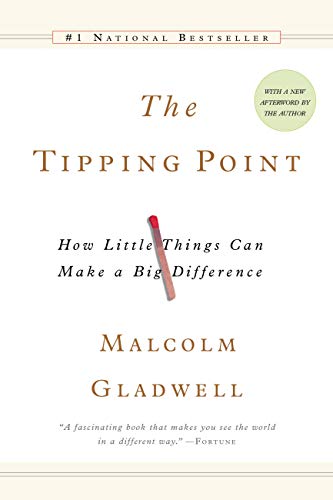The Tipping Point: How Little Things Can Make a Big Difference by Malcolm Gladwell Link to heading
Summary Link to heading
“The Tipping Point” is a fascinating exploration of how small, seemingly insignificant events can lead to widespread social change. Malcolm Gladwell introduces the concept of the “tipping point,” which he describes as the moment of critical mass or boiling point when an idea, trend, or social behavior crosses a threshold and spreads like wildfire. Gladwell presents several case studies and examples across various domains, such as public health, crime reduction, fashion trends, and social epidemics, to illustrate his thesis. The book emphasizes three key factors that contribute to tipping points: the Law of the Few, the Stickiness Factor, and the Power of Context.
Review Link to heading
Malcolm Gladwell’s “The Tipping Point” offers a compelling and accessible look into the mechanics of social change. The book is praised for its engaging storytelling and the ability to make complex concepts understandable to a wide audience. Gladwell’s use of real-life examples to demonstrate theoretical concepts helps solidify reader understanding. However, some critiques point out that while the anecdotes are captivating, they sometimes lack deep scientific analysis or empirical backing.
Key Takeaways Link to heading
The Law of the Few: Critical roles are played by three types of people in the spread of ideas—Connectors, who know many people; Mavens, who are knowledgeable and share their insights; and Salesmen, who possess persuasive skills.
The Stickiness Factor: For an idea to propagate, it needs to be memorable and impactful. Small changes in presentation or context can significantly affect how contagious messages are.
The Power of Context: Environmental and contextual factors heavily influence people’s behaviors. Minor changes in surroundings can lead to dramatic behavioral shifts in society.
Social Epidemics: Social change acts similarly to viral epidemics, where small, well-targeted actions can lead to large-scale effects.
Recommendation Link to heading
“The Tipping Point” is highly recommended for readers interested in understanding the dynamics of social change and the factors that catalyze rapid societal shifts. It’s particularly valuable for business leaders, marketers, educators, and policymakers who wish to influence group behavior or drive change. The book’s engaging style and insightful observations make it an enlightening read for anyone curious about why certain ideas become dominant while others fade away.
